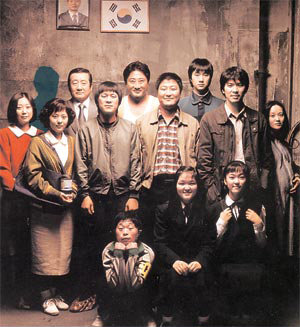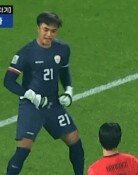Preview: Premiere Memories of Murder

# Thriller or political conspiracy movie?
Movie critic Shim Young-sup defines "Memories of Murder" as a "movie depicting a huge political conspiracy." The movie takes the Hwasung Serial Murder case as its setting. But the main theme lies somewhere else. Director Bong defines it as "a movie through which we can look directly back into the 1980s." In other words, it is a movie that focuses on social settings and the people who reacted to a certain case. In this respect, it is not one of those whodunits.
That is why the "strong" suspect comes up on screen near the end. In a regular thriller, the culprit emerges at least by the middle and has to play a "catch me" type of game with the viewers. But this film zooms up how torture forces alleged suspects, who everyone can tell have nothing to do with the case, to cough up false statements. In fact, the police conducted investigations on 3,000 people.
Director Bong continues, "I tried to depict an era when it was impossible to catch a serial killer who lived a much advanced time." He reasons that the inability of the police symbolizes that of the government and the whole society.
# 1980s: Mixture of Rationality and Irrationality
This movie takes on the characteristics of the "buddy movie." It stars a "country detective" Park Doo-man (acted by Song Kang-ho) and "urban cop" Suh Tea-yoon (Kim Sang-kyung) from the Seoul Police Department. The two team up and chase the serial killer together. But their approaches are extremely oppopsite to each other. Park bases his investigation on hunch, while Suh will not believe anything that is not scientific. Unable to catch the killer, Park resorts to a fortune-teller and carries a talisman written by the teller. On the other hand, Suh indulges himself deeper into the heap of documents, looking for a "scientific clue." But both end up with empty hands. Unknowingly, their mutual despise is turning into an affinity and makes them identical bit by bit.
Taking the two opposite figures, the movie reminds us of the reality of the 1980s when rationality and irrationality coexisted. The budding democracy in South Korea after the assassination of President Park soon died out in the ensuing military coup and ruling by Chun Doo-hwan. These social settings are reflected in this movie and its main theme through a tunnel metaphor. At the beginning and closing of the film, the camera draws our attention to the water duct where the first victim is found by detective Park. At the climax where Park and Suh are fighting with the suspect Hyun-gyun, a tunnel shows up again, through which the suspect calmly walks away. Inside a tunnel where darkness dominates, we cannot tell which is which. In other words, this film refreshes our memory of how we could walk through the dark tunnel of the 1980s.
# Attaboys, Song and Kim
Song Kang-ho has mostly played a comic character so far. In "Sympathy for Mr. Vengeance," he played a cold-blooded person engulfed in revenge. But viewers did not like it.
In "Memories of Murder," through the character Park Doo-man, Song shows all aspects of him. In the movie, Park racks his brain to arrest the killer in order not to do justice, but to fulfill his detective duty. After teaming up with Suh, however, Park is getting more and more serious and immersed into the case. Especially, we realize the best actor in Song, when, during a fist fight with suspect Hyungyun, Park (or Song) grabs suspect`s collars and asks, full of resentment and bitterness, "Hey, pal, did you dig in at all?" In the meanwhile, Kim Sang-kyung does not stand out at first. But he immaculately portrays detective Suh who turns mad, getting close to the killer.
Coming to theater on April 25. PG-15.
Soo-Kyung Kim skkim@donga.com







